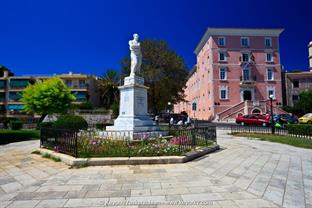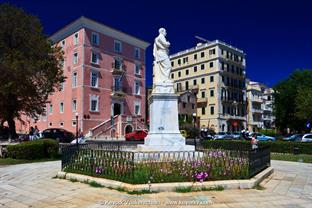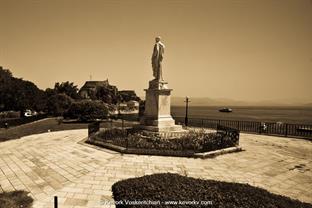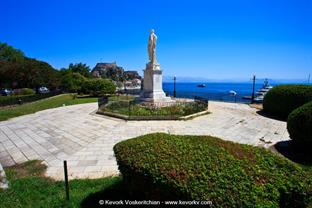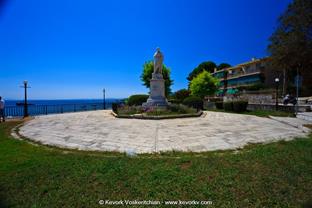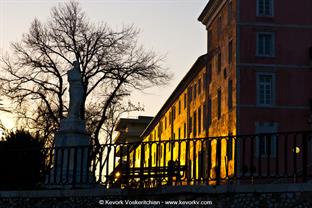





© 2016 All CopyRights Reserved
All content is copyrighted, no part my be copied, or used, for any reason, without the prior written agreement.
Any and all copyright violation will be legally prosecuted.
Getting There
The monument ovelooks the Old Fortress infront of the Ioanian Academy. His mansion is the village of Evraiopolis
The monument ovelooks the Old Fortress infront of the Ioanian Academy. His mansion is the village of Evraiopolis
View In Corfu - Historical Points of Interest in a larger map

Ioannis Kapodistrias was born in Corfu, at the time of his birth the island was a possession of Venice. He studied medicine, philosophy and law at Padua, in Italy. When he was 21 years old, in 1797, he started his medical practice as a doctor in Corfu. He was throughout his life a deeply liberal thinker and a true democrat, though born and raised as a nobleman. An ancestor of Kapodistrias' had been created a conte (count) by Charles Emmanuel II, Duke of Savoy, and the title was later (1679) inscribed in the Libro d’Oro of the Corfu nobility; the title originates from Capodistria, a city on the eastern shore of the Gulf of Venice, now Koper in Slovenia and the place of origin of Kapodistrias' family before they moved to Corfu in the 13th century where they changed their dogma from Catholic to Orthodox and they soon became hellenized. In 1802 Ioannis Kapodistrias founded an important scientific and social progress organisation in Corfu, the "National Medical Association", of which he was an energetic member. In 1799, when Corfu was briefly occupied by the forces of Russia and Turkey, Kapodistrias was appointed chief medical director of the military hospital.
After two years of revolutionary freedom, triggered by the French Revolution and the ascendancy of Napoleon, in 1799 Russia and the Ottoman Empire drove the French out of the seven Ionian islands and organised them as a free and independent state - the Septinsular Republic - ruled by its nobles. Kapodistrias, substituting for his father, became one of two ministers of the new state. Thus, at the age of 25, Kapodistrias became involved in politics. In Cephallonia he was successful in convincing the populace to remain united and disciplined to avoid foreign intervention and, by his argument and sheer courage, he faced and appeased rebellious opposition without conflict. With the same peaceful determination he established authority in all the seven islands.
He listened to the voice of the people and initiated democratic changes to the "Byzantine Constitution" that the Russian-Ottoman alliance had imposed, which caused the Great Powers to send an envoy, George Motsenigo, to reprimand him. However, when the envoy met Kapodistrias, he was impressed by the political and ethical worth of the man.
When elections were carried for a new Senate, Kapodistrias was unanimously appointed as Chief Minister of State. In December, 1803, a less feudal and more liberal and democratic constitution was voted by the Senate. As a minister of state he organised the public sector, putting particular emphasis on education. In 1807 the French re-occupied the islands and they dissolved the Septinsular Republic.
In 1809 Kapodistrias entered the service of Alexander I of Russia. His first important mission, in November 1813, was as unofficial Russian ambassador to Switzerland, with the task of helping disentangle the country from the French dominance imposed by Napoleon. He secured Swiss unity, independence and neutrality, which were formally guaranteed by the Great Powers, and actively facilitated the initiation of a new Constitution for the 19 cantons that were the component states of Switzerland, with personal drafts. In the ensuing Congress of Vienna, 1815, as the Russian minister, he counterbalanced the paramount influence of the Austrian minister and insisted on French state unity under a Bourbon monarch. He also obtained new international guarantees for the Constitution and neutrality of Switzerland through an agreement among the Powers. After these brilliant diplomatic successes, Alexander I appointed Kapodistrias joint Foreign Minister of Russia.
He was always keenly interested in the cause of his native country, and in particular the state of affairs in the Seven Islands, which in a few decades’ time had passed from French revolutionary influence to Russian protection and then British rule. He always tried to attract his Emperor's attention to matters Greek.
Kapodistrias visited his Ionian homeland, by then under British rule, in 1818, and in 1819 he went to London to discuss the islanders' grievances with the British government, but the British gave him the cold shoulder partly because of the fact that, uncharacteristically, he refused to show them the memorandum he wrote to the czar about the subject.Kapodistrias became increasingly active in support of Greek independence from the Ottoman Empire, but did not succeed in obtaining Alexander's support for the Greek revolution of 1821. This put Kapodistrias in an untenable situation and in 1822 he took an extended leave of absence from his position as Foreign Minister and retired to Geneva where he applied himself to supporting the Greek revolution by organising material and moral support.
After two years of revolutionary freedom, triggered by the French Revolution and the ascendancy of Napoleon, in 1799 Russia and the Ottoman Empire drove the French out of the seven Ionian islands and organised them as a free and independent state - the Septinsular Republic - ruled by its nobles. Kapodistrias, substituting for his father, became one of two ministers of the new state. Thus, at the age of 25, Kapodistrias became involved in politics. In Cephallonia he was successful in convincing the populace to remain united and disciplined to avoid foreign intervention and, by his argument and sheer courage, he faced and appeased rebellious opposition without conflict. With the same peaceful determination he established authority in all the seven islands.
He listened to the voice of the people and initiated democratic changes to the "Byzantine Constitution" that the Russian-Ottoman alliance had imposed, which caused the Great Powers to send an envoy, George Motsenigo, to reprimand him. However, when the envoy met Kapodistrias, he was impressed by the political and ethical worth of the man.
When elections were carried for a new Senate, Kapodistrias was unanimously appointed as Chief Minister of State. In December, 1803, a less feudal and more liberal and democratic constitution was voted by the Senate. As a minister of state he organised the public sector, putting particular emphasis on education. In 1807 the French re-occupied the islands and they dissolved the Septinsular Republic.
In 1809 Kapodistrias entered the service of Alexander I of Russia. His first important mission, in November 1813, was as unofficial Russian ambassador to Switzerland, with the task of helping disentangle the country from the French dominance imposed by Napoleon. He secured Swiss unity, independence and neutrality, which were formally guaranteed by the Great Powers, and actively facilitated the initiation of a new Constitution for the 19 cantons that were the component states of Switzerland, with personal drafts. In the ensuing Congress of Vienna, 1815, as the Russian minister, he counterbalanced the paramount influence of the Austrian minister and insisted on French state unity under a Bourbon monarch. He also obtained new international guarantees for the Constitution and neutrality of Switzerland through an agreement among the Powers. After these brilliant diplomatic successes, Alexander I appointed Kapodistrias joint Foreign Minister of Russia.
He was always keenly interested in the cause of his native country, and in particular the state of affairs in the Seven Islands, which in a few decades’ time had passed from French revolutionary influence to Russian protection and then British rule. He always tried to attract his Emperor's attention to matters Greek.
Kapodistrias visited his Ionian homeland, by then under British rule, in 1818, and in 1819 he went to London to discuss the islanders' grievances with the British government, but the British gave him the cold shoulder partly because of the fact that, uncharacteristically, he refused to show them the memorandum he wrote to the czar about the subject.Kapodistrias became increasingly active in support of Greek independence from the Ottoman Empire, but did not succeed in obtaining Alexander's support for the Greek revolution of 1821. This put Kapodistrias in an untenable situation and in 1822 he took an extended leave of absence from his position as Foreign Minister and retired to Geneva where he applied himself to supporting the Greek revolution by organising material and moral support.




















































